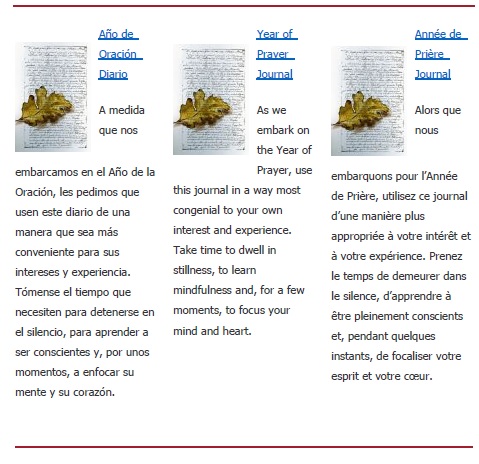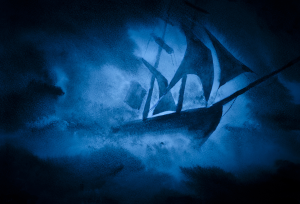None of this is reassuring if we do not see God in the storm
None of this is reassuring if we do not see God in the storm
“The creaking masts, the sails hastily folded or torn to pieces, the helm abandoned in order to ease the ship, all this is not pleasant for those who do not see God in the storm.”1
Philippine, an energetic woman, a lover of truth, did not hesitate to describe what was not ‘beautiful’ in the Rebecca’s journey. She says in her letter, “I shall not conceal from you the dangers of the sea nor my own weakness.”2
What an invitation to us to communicate truthfully the reality of our daily “journeys”! The storms that invade our lives today: violence, death, fanaticism, exclusion, apathy, difficulties which bring out our weaknesses, fragilities, fears. How can I discover God in my storm? How can I see with God’s eyes? For Philippine, God was in all those signs of nature. She drew strength, she had other sisters she had to support, especially Sister Catherine, who was suffering and felt she could not continue the journey. Philippine sang the Ave Maris Stella, people said she had a lovely voice and the captain of the Rebecca insisted that she sing this beautiful song because it attracted good weather. What are our “songs” to attract good weather? The song became prayer, in abandonment, in the certainty that God was there … as on the Sea of Galilee. My favourite prayer is community prayer … there the storm is stilled.
Sandra Cavieres, RSCJ, Province of Chile
Image: Shutterstock
1 Eng : Life of Mother Duchesne by Abbé Baunard, Roehampton, 1879, translated by Lady Georgiana Fullerton, 148.
2 Idem., 147.
Nada de esto es tranquilizador si no se ve a Dios en la tempestad
“…Los mástiles se doblan, las velas se despedazan, el timón que se suelta para no estropear tanto el navío, nada de esto es tranquilizador si no se ve a Dios en la tempestad”i
Filipina mujer enérgica, amante de la verdad, no duda en describir lo que no es “hermoso” del viaje en el Rebecca. Dice en su carta: “no les ocultaré los peligros del océano ni mi propia flaqueza”.ii
¡Qué invitación a nuestras vidas para comunicar con verdad, la realidad de “los viajes” del día a día! Esas tormentas que nos invaden hoy: violencia, muerte, fanatismos, exclusiones, indolencias, dificultades en las que salen nuestras flaquezas, fragilidades, temores. ¿Cómo descubrirlo en mi tempestad? ¿Cómo mirar con los ojos de Dios? Para Filipina, Dios estaba en todos esos signos de la naturaleza. Ella tomaba fuerzas, tenía otras hermanas a las cuales debía sostener, especialmente la Hna Catalina que sufría y pensaba que no podía seguir con el viaje. Filipina cantaba el “Ave Maris Stella”, decían que tenía una hermosa voz, y el capitán del Rebecca le insistía que cantaran esa bella canción pues, ese canto atraía el buen tiempo. ¿Cuáles son nuestros “cantos” para atraer el buen tiempo? El canto se transformaba en oración, en abandono, en certeza que Dios estaba ahí… como en el mar de Galilea. Mi canto preferido es la oración en comunidad … allí se calma la tormenta.
Sandra Cavieres, RSCJ, Provincia de Chile
Imagen: Shutterstock
i MONS.BAUNARD. MISIONERA. Imprenta Sta. Magdalena Sofía, Santiago de Chile 1941. Pág. 212-213.
ii Idem pág. 212.
Rien de tout cela n’est rassurant si l’on ne voit pas Dieu dans la tempête
« …Les mats qui plient, les voiles qu’on resserre ou qui se déchirent, le gouvernail qu’on abandonne pour ne pas trop fatiguer le vaisseau, tout cela n’est point riant quand on ne voit pas Dieu dans l’orage. »1
Philippine, femme énergique, aimant la vérité, n’hésite pas à décrire ce qui n’est pas « beau » du voyage à bord de la Rebecca. Dans sa lettre, elle écrit : “Je ne vous cacherai rien ni des dangers de la mer, ni de ma propre faiblesse.” 2
Quelle invitation à communiquer sincèrement la réalité de nos « voyages » quotidiens ! Ces tempêtes qui nous envahissent aujourd’hui : violence, mort, fanatisme, exclusion, indifférence, difficultés qui font ressortir nos faiblesses, nos fragilités et nos craintes. Comment découvrir Dieu dans ma tempête ? Comment voir avec les yeux de Dieu ? Pour Philippine, Dieu était dans tous ces signes de la nature. Elle prenait des forces, elle avait d’autres sœurs qu’elle devait soutenir, en particulier Sœur Catherine qui souffrait et pensait ne pas réussir à poursuivre le voyage. Philippine chantait l’« Ave Maris Stella ». On disait qu’elle avait une belle voix et le capitaine de la Rebecca insistait pour qu’elle chante ce magnifique chant, qui attirait le beau temps. Quels sont nos « chants » pour attirer le beau temps ? Le chant se transformait en prière, en abandon, en certitude que Dieu était là… tout comme en mer de Galilée. Mon chant préféré est la prière en communauté… c’est là que se calme la tempête.
Sandra Cavieres, RSCJ, Province de Chili
Image : Shutterstock
1 Baunard, Une Grande Missionnaire Philippine Duchesne, J. de Gigord, Editeur, Paris. Edition de la Béatification, 1940. 176.
2 Idem.
![]()

If you received this message from a friend and would like to receive our messages directly in the future, please sign up on our website.
Has your contact information changed recently? Update your full contact information and your mailing preferences.
Society of the Sacred Heart
4120 Forest Park Avenue, Saint Louis, MO 63108










